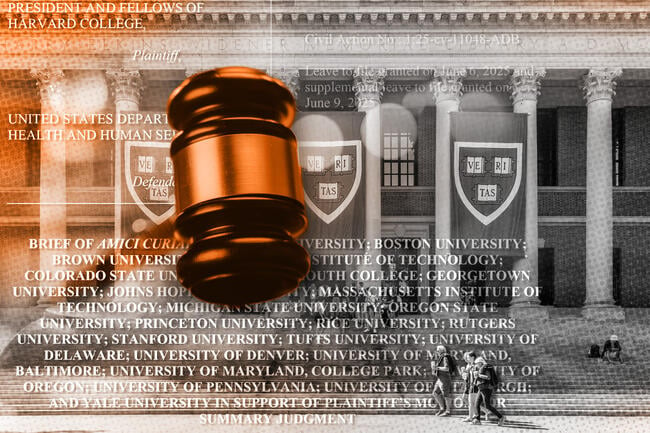You have /5 articles left.
Sign up for a free account or log in.

Photo illustration by Justin Morrison/Inside Higher Ed | greenleaf123/iStock/Getty Images | APCortizasJr/iStock/Getty Images
Pushback to the Trump administration’s attack on Harvard University is growing as more than 50 colleges, academic associations and First Amendment advocacy groups publicly backed the university in court this week.
And while each coalition or group made its own argument in filings against the unprecedented research funding cuts, which are the focus of the lawsuit, legal experts say there’s one motive they all share.
“We want to file a brief that offers the court a broader perspective about the significance of the case than what the individual litigants might offer,” said Peter McDonough, vice president and general counsel for the American Council on Education, which filed its own brief. “There really are enormous issues here at stake … because if the government can do this to Harvard, it can do it to any institution of higher education, probably any secondary school and maybe even to public school districts that rely on federal funds.”
Harvard first sued in early April after the administration froze more than $2 billion in federal funds—a move that Harvard argues is unlawful. This lawsuit against the Department of Health and Human Services is separate from the university’s fight to keep its international students, which is also playing out in court.
As of Tuesday afternoon, at least 14 friend-of-the-court briefs—or documents filed by groups that are not direct parties in the case—had been submitted; one was signed by 24 prominent research universities. Others were filed by ACE, the Foundation for Individual Rights and Expression and more than 12,000 Harvard alumni.
The suit is currently being heard by Judge Allison Burroughs in the U.S. District Court of Massachusetts, and Harvard has asked the judge for a summary judgment, which would allow her to rule without a full trial. McDonough told Inside Higher Ed that briefs like this are normally only filed once a case reaches an appellate court, but Burroughs made an exception, likely due to the urgency of the situation.
Many outside observers say that Harvard’s lawsuit will likely have broader ramifications for the administration’s ongoing attacks against higher education.
“It’s rather unusual, but not unprecedented,” McDonough said. “But because the issues are so immediate and so significant, we submitted this brief. And I presume that the other amicus briefs being submitted are similarly motivated.”
What Do the Briefs Say?
Although the lawsuit was first filed in response to the administration’s April decision to cut off more than $2 billion in federal funds, Harvard has since added other examples to bolster its case that the Trump administration is retaliating against the university for refusing to capitulate to a long list of demands.
After the initial freeze of $2.2 billion, the federal government has since cut Harvard off from any future grant funding, retracted another $450 million in existing grants and moved to end $100 million in university contracts, among other cuts.
The 24 colleges and universities—which include all but two of the Ivy League institutions, Columbia and Cornell—argued in their brief that under the funding freeze, “even schools that do not experience direct cuts will suffer.”
For example, the colleges say that funding cuts could threaten a National Institutes of Health–funded project from Harvard, the Massachusetts Institute of Technology and Princeton University to create diagrams of how the brain is wired. The tool could eventually help advance treatments of memory loss and diseases like Alzheimer’s. But the whole project could be at risk if Harvard scholars can no longer contribute.
In a letter to her university, Sally Kornbluth, president of MIT, which signed on to the brief, said that while the value of federally funded university research “feels obvious,” it was important to make a case to the court about “its countless benefits.”
Similarly, Crimson Courage, a group of more than 12,000 Harvard alumni, said the administration’s actions were an “existential threat” to their alma mater’s mission of research and scholarship. But the organization also zoomed out to argue that the funding freeze is a threat to American democracy at large.
“The government’s end goal is to narrow our freedoms to learn, teach, think, and act, and to claim for itself the right to dictate who may enjoy those freedoms,” the alumni wrote. “The heavy hand of the Government is incompatible with open inquiry, the pursuit of truth, and the academic freedom guaranteed by the First Amendment.”
ACE and a slew of other academic associations made a similar argument in their brief, saying that the administration’s actions have largely ignored due process and are “radically incompatible with the constitutional separation of powers and the strictures of the First Amendment.”
“The executive branch may not cloak efforts to achieve these impermissible goals in a pretense of lawful authority over grant funding,” the brief reads. “Even where the executive branch enjoys some measure of delegated discretion over government benefits, such as grant funding, it ‘may not deny [that] benefit to a person on a basis that infringes’ the Constitution.”
McDonough hopes that the arguments in support of Harvard will make it clear that the judge’s ruling on this case will impact the future of all academia and, “frankly, the country.”
“It shouldn’t be up for debate that this administration has to acknowledge and respect the rule of law, but it is, and that’s the grave risk,” he said.



